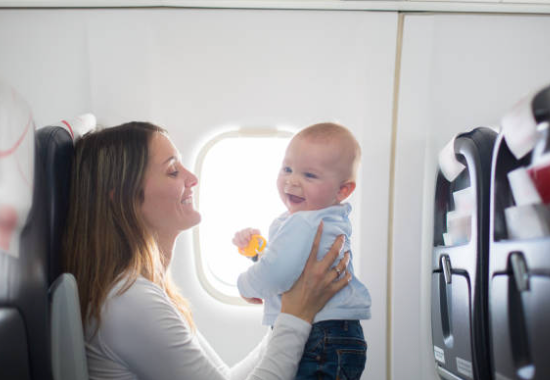Flying with a baby can be daunting, but with the right tips, it can become a smooth journey. Whether you’re a first-time parent or a seasoned traveler, knowing how to navigate airports and flights with your little one is key to a stress-free experience. From packing essentials to soothing techniques, we’ve got you covered with practical advice to make your trip enjoyable for both you and your baby. Let’s dive into these valuable insights that will help you feel more prepared and confident on your next adventure in the skies.
Preparing for the Flight
Packing Essentials
When flying with your baby, ensure to pack diapers, wipes, extra clothes, snacks, toys, and comfort items like pacifiers or blankets. Having these essentials handy can make the journey smoother.
Before boarding, organize passports, tickets, and any necessary medical documents in a convenient travel pouch. This preparation helps streamline the check-in process and reduces stress during security checks.
Our top picks are:
Plan your flight schedule around your baby’s sleep routine to increase the chances of a peaceful journey. Opt for flights that align with your little one’s nap times to encourage them to rest on the plane. You should plan to take some necessary items to help your little one while flying. Here are some of our suggestions.
- Ergobaby Embrace Cozy Newborn Baby Wrap Carrier – easy to put on or take off, perfect for newborn to approximately 12 months old, soft, lightweight and machine washable.
- Toddlers Airplane Travel Toys Montessori Toys for Babies 6-12 Months – Keep your baby busy for hourswith airplane activities toy. Small size, easy to carry, perfect for car/stroller/airplane.
- Baby Ear Muffs Noise Protection – Keep your child’s hearing safe with Kiddieware Baby Noise Cancelling Headphones for Kids. They are lightweight, comfortable and designed for a perfect fit.
- UPPAbaby Minu V2 Travel Stroller – lightweight, designed for a one hand fold, shoulder strap, large under basket and extendable UPF 50+ canopy. Available for purchase with carseat.
- Padded Stroller Bag for Airplane Compatible with UPPAbaby – compact for stoller storage, backpack style, two inner pockets for extra storage.
- My Best Friend Inflatable Travel Pillow – compact, inflatable, soothing and stress-free feeding experience with this ergonomic design
Flying with a baby can be challenging, especially for toddlers. It is generally advised to wait until the baby is at least two weeks old before flying. This allows time for the newborn to adjust to the outside world.
Health Considerations
When planning air travel with your little one, it’s crucial to consider their immunity and overall health. Babies are more susceptible to illnesses due to their developing immune systems. Avoid traveling during peak flu seasons or when your baby is unwell.
Before embarking on a flight with your newborn, consulting with a pediatrician is highly recommended. They can provide valuable advice tailored to your baby’s specific needs and health status. Your pediatrician can also guide you on necessary precautions and medications suitable for air travel.
Seating Arrangements and Safety
Seat Selection
When flying with a baby, choosing the right seat is crucial for safety and comfort. Opt for an aisle seat to easily move around with your little one during the flight. If possible, consider booking an extra seat or aiming for an empty seat beside you to have more space. This will be necessary if you want to bring a carrier for your baby to rest in.
Ensure that your baby has a designated seat with an appropriate seat belt for their size. Look for FAA-approved child safety restraints, such as CARES harnesses, which are specifically designed for airplane travel.
Selecting a seat strategically can make a significant difference in your flying experience with a baby. If you prefer more privacy and less disturbance, go for a window seat. For quick access to the aisle and facilities, an aisle seat might be more suitable.
Pros:
- Enhanced safety measures
- More convenience during the flight
Cons:
- Limited availability of extra seats
- Additional cost for booking multiple seats

Packing Essentials for Baby
Diapers and Changing Supplies
Pack enough diapers, wipes, and changing essentials for the flight to handle any unexpected situations. Ensure you have a surplus to last throughout the journey.
Feeding Necessities
Include snacks, formula, or breast milk in your carry-on baggage for feeding your baby during the flight. Having these essentials readily available can help soothe your little one.
Comfort Items and Toys
Bring along your baby’s favorite toys or comfort items to keep them entertained and calm during the journey. Familiar items can provide a sense of security in an unfamiliar environment.
Navigating Airport Security
Rules and Security Checks
Familiarize yourself with the rules for carrying liquids through security. Ensure all baby essentials comply.
Be prepared to remove the baby from carriers or strollers during security checks. This process ensures safety.
Arrive at the airport early to allow extra time for security procedures. Early arrival prevents rush.

Managing In-Flight Comfort
Dressing for Comfort
When flying with a baby, ensure comfortable layers to manage temperature changes easily. Opt for soft fabrics.
Soothing Strategies
Prepare a plan to soothe your baby during takeoff and landing. Offer a pacifier or breastfeed to ease ear pressure.
Distractions for Contentment
Utilize distractions like toys or books to keep your baby content during the flight. Engage them with interactive toys.
Feeding and Soothing Strategies
Ascent and Descent
Be prepared to feed your baby during takeoff and landing to help alleviate ear pressure. This can be done through bottle feeding or breastfeeding, which helps regulate the pressure changes.
Consider offering a pacifier to your baby during these times as sucking can also help equalize ear pressure. Alternatively, breastfeeding provides both nourishment and comfort to your little one.
Comfort Items
Bringing along familiar items like blankets or swaddles can provide a sense of security and comfort for your baby during the flight. These familiar objects can help soothe them and make the journey more pleasant.
Remember to consult with your pediatrician beforehand regarding any specific baby food or feeding concerns while traveling. Their guidance can ensure a smooth and comfortable experience for both you and your baby.
Health and Safety Considerations
Hygiene Maintenance
Keep hand sanitizer and disinfectant wipes handy to ensure cleanliness throughout the journey. Regularly sanitizing surfaces can help reduce the risk of exposure to infectious diseases, safeguarding both you and your baby.
Encourage hydration by offering fluids to your baby frequently during the flight. Staying hydrated is crucial for overall health, especially in the dry environment of an airplane cabin. Dehydration can lead to various health issues, so it’s essential to keep your little one well-hydrated. Here are a items we feel are must haves.
- Hand Sanitizing Travel Wipes – maintain hygiene with individually packed premium hand sanitizing wipes
- First Aid All-Purpose Emergency First Aid Kit for Home, Work, and Travel – compact to fit in travel bags and offers a full line of necessary first aid items.
- KeepGoing Kids First Aid Kit – 130 pcs and TSA approved.
- BabbleRoo Diaper Bag Backpack – durable and waterproof, includes 2 main compartments, 5 insulated pockets, a wipe pocket, and a dedicated multi-function changing pad pocket holds tablets and laptops up to 15.6″
Air Travel Health Concerns
Air travel can pose certain health challenges for babies, such as ear discomfort due to changes in air pressure. To alleviate this, consider feeding or giving a pacifier during take-off and landing to help equalize ear pressure. Dress your baby in comfortable clothing to prevent overheating or discomfort.
- Pros:
-
- Maintaining hygiene reduces the risk of infections.
- Proper hydration supports overall health during the flight.
- Cons:
-
- Additional costs may be incurred for purchasing hygiene products.
- Babies may resist drinking fluids, leading to dehydration concerns.

Closing Thoughts
You now have a comprehensive guide on flying with your baby, covering everything from preparation to in-flight strategies. By considering your baby’s needs and safety at every step, you can ensure a smoother and more enjoyable travel experience for both of you. Remember to pack wisely, prioritize comfort, and stay flexible to handle any unexpected situations that may arise.
As you embark on your next journey with your little one, use these tips to navigate air travel with confidence. Your proactive approach and thoughtful planning will not only ease the process but also create lasting memories of precious moments shared with your baby. Safe travels and enjoy the adventures that await you!
Key Takeaways
- Plan Ahead: Preparing for the flight by packing essentials, considering seating arrangements, and understanding safety protocols can make the travel experience smoother.
- Tailor to Baby’s Age: Be mindful of the baby’s age and unique needs when planning air travel to ensure comfort and safety during the journey.
- Prioritize Safety: Choose seating arrangements that comply with safety regulations and pack necessary items like a car seat or baby carrier for secure travel.
- Pack Wisely: Ensure you have all necessary items for the baby, such as diapers, wipes, snacks, toys, and extra clothing, to handle any situation during the flight.
- Stay Informed: Familiarize yourself with airport security procedures to navigate them efficiently and minimize stress before boarding the flight.
- Comfort is Key: Implement feeding and soothing strategies to keep the baby content during the flight, such as breastfeeding, using pacifiers, or bringing favorite toys.
- Health First: Consider health and safety considerations by carrying essential medications, sanitizing frequently, and being prepared for any potential medical needs during the journey.
Frequently Asked Questions
Can I bring baby food and formula through airport security?
Yes, you can bring baby food, formula, and breast milk through airport security. These items are exempt from the usual liquid restrictions. Inform the security officers and be prepared for additional screening if needed.
What seating arrangement is best when flying with a baby?
Choose seats near the bulkhead for more legroom and easier access to your carry-on items. Consider booking a bassinet seat if available. Aim for a window seat to provide a bit more privacy and comfort during the flight.
How can I keep my baby comfortable during the flight?
Dress your baby in layers for temperature control. Bring familiar toys, blankets, and pacifiers for comfort. Consider using noise-canceling headphones or earplugs to help reduce cabin noise that might disturb your baby’s sleep.
What health precautions should I take when flying with a baby?
Ensure your baby is up-to-date on vaccinations before traveling. Pack essential medications in your carry-on bag. Use hand sanitizer frequently and wipe down surfaces to minimize exposure to germs in the airplane environment.
Is it safe to fly with a newborn baby?
Generally, it is safe to fly with a newborn as long as they are healthy. Consult your pediatrician before making travel plans, especially if your baby was born prematurely or has any health concerns. Follow safety guidelines for air travel with infants closely.
Disclaimer
Kirbys On The Move is reader-supported. When you buy through links on our site, and we may earn an affiliate commission. These are items that we have used ourselves or that our friends have used and loved. If you take action and make a purchase after clicking one of our links, we promise to continue supporting you with great-quality information, and you will not pay a higher cost by using our link to make a purchase.



